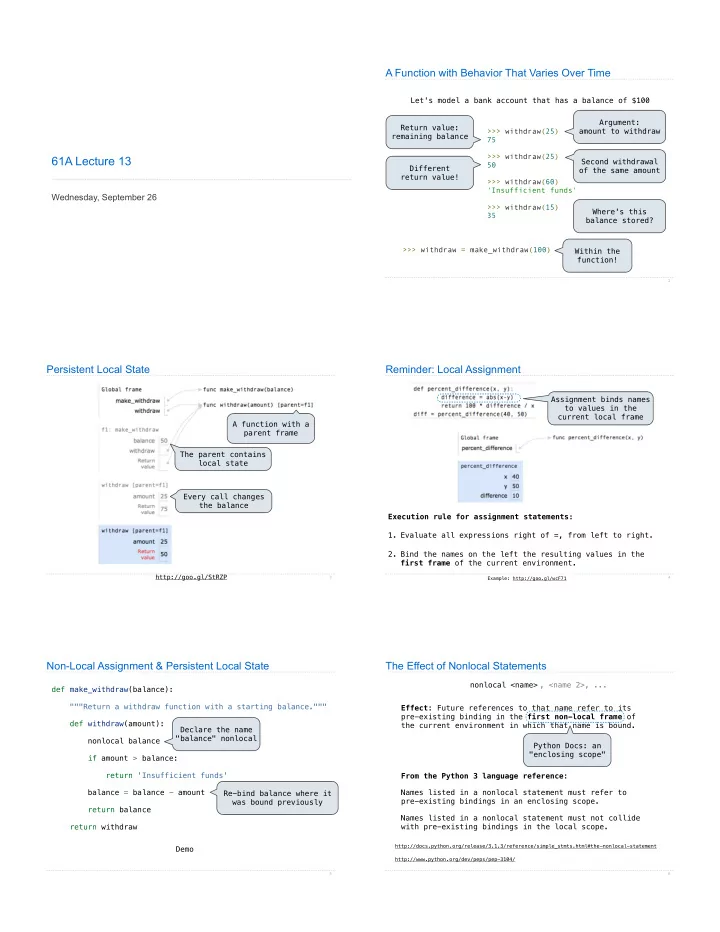

A Function with Behavior That Varies Over Time Let's model a bank account that has a balance of $100 Argument: Return value: >>> withdraw(25) amount to withdraw remaining balance 75 >>> withdraw(25) 61A Lecture 13 Second withdrawal 50 Different of the same amount return value! >>> withdraw(60) 'Insufficient funds' Wednesday, September 26 >>> withdraw(15) Where's this 35 balance stored? >>> withdraw = make_withdraw(100) Within the function! 2 Persistent Local State Reminder: Local Assignment Assignment binds names to values in the current local frame A function with a parent frame The parent contains local state Every call changes the balance Execution rule for assignment statements: 1. Evaluate all expressions right of =, from left to right. 2. Bind the names on the left the resulting values in the first frame of the current environment. http://goo.gl/StRZP 3 4 Example: http://goo.gl/wcF71 Non-Local Assignment & Persistent Local State The Effect of Nonlocal Statements nonlocal <name> , <name 2>, ... def make_withdraw(balance): """Return a withdraw function with a starting balance.""" Effect : Future references to that name refer to its pre-existing binding in the first non-local frame of def withdraw(amount): the current environment in which that name is bound. Declare the name "balance" nonlocal nonlocal balance Python Docs: an "enclosing scope" if amount > balance: return 'Insufficient funds' From the Python 3 language reference : balance = balance - amount Names listed in a nonlocal statement must refer to Re-bind balance where it pre-existing bindings in an enclosing scope. was bound previously return balance Names listed in a nonlocal statement must not collide with pre-existing bindings in the local scope. return withdraw http://docs.python.org/release/3.1.3/reference/simple_stmts.html#the-nonlocal-statement Demo http://www.python.org/dev/peps/pep-3104/ 5 6
The Many Meanings of Assignment Statements Python Particulars x = 2 Python pre-computes which frame contains each name before Status Effect executing the body of a function. Create a new binding from name "x" • No nonlocal statement Therefore, within the body of a function, all instances of a to object 2 in the first frame of • "x" is not bound locally the current environment. name must refer to the same frame. • No nonlocal statement Re-bind name "x" to object 2 in the • "x" is bound locally first frame of the current env. • nonlocal x Re-bind "x" to 2 in the first non- • "x" is bound in a local frame of the current non-local frame environment in it is bound. Local assignment • nonlocal x SyntaxError: no binding for nonlocal • "x" is not bound in 'x' found a non-local frame • nonlocal x • "x" is bound in a SyntaxError: name 'x' is parameter non-local frame and nonlocal • "x" also bound locally 7 8 Mutable Values & Persistent Local State Creating Two Different Withdraw Functions Mutable values can be changed without a nonlocal statement. Mutable value can change Demo Name-value binding cannot change 9 10 The Benefit of Non-Local Assignment Multiple References to a Single Withdraw Function •Ability to maintain some state that is local to a function, but evolves over successive calls to that function. •The binding for balance in the first non-local frame of the environment associated with an instance of withdraw is inaccessible to the rest of the program. •An abstraction of a bank account that manages its own Demo internal state. John's Steven's Account Account $10 $1,000,000 11 12
Sameness and Change Referential Transparency, Lost • As long as we never modify objects, we can regard a compound object •Expressions are referentially transparent if substituting an to be precisely the totality of its pieces . expression with its value does not change the meaning of a program. • A rational number is just its numerator and denominator. • This view is no longer valid in the presence of change . mul(add(2, mul(4, 6)), add(3, 5)) • Now, a compound data object has an "identity" that is something more than the pieces of which it is composed. mul(add(2, 24 ), add(3, 5)) • A bank account is still "the same" bank account even if we change the balance by making a withdrawal. mul( 26 , add(3, 5)) • Conversely, we could have two bank accounts that happen to have the same balance, but are different objects . •Re-binding operations violate the condition of referential John's Steven's transparency because they let us define functions that do Account Account more than just return a value; we can change the environment , causing values to mutate. $10 $10 Demo 13 14
Recommend
More recommend